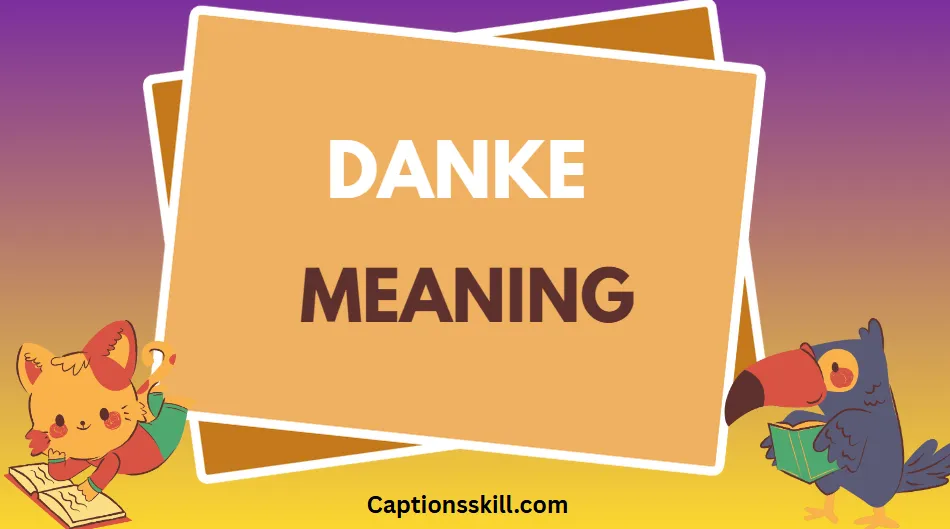The word “danke” may look small, but it carries big meaning in the German language. If you have ever visited Germany or watched a German movie, you’ve probably heard it. It is one of the most commonly used words, just like “hello” or “goodbye.” But do you really know what “danke” means, how it is used, or where it comes from?
In this article, we will explore the true meaning of “danke,” understand how it is used in daily life, and dive into its rich history. We will also look at how people pronounce it, whether it’s a slang word or not, and how its use has changed over the years. Many people use words without thinking about their roots or cultural weight, but “danke” is a word that tells a story.
We will also learn about related words like “nein danke” and why some people say “danke danke.” You’ll see how this word fits into polite conversation and how it has shaped the way people express gratitude in German-speaking countries. Even if you are not learning German, knowing what “danke” means can be useful. It’s not just about language. It’s also about kindness and connection.
Now let’s begin with the basic question.
What Does “Danke” Mean?
The word “danke” is a simple and polite way to say “thank you” in German. It is used when someone wants to show gratitude or appreciation. Whether you’re receiving a gift, getting help from someone, or even when a person holds the door open for you, saying “danke” is the right thing to do.
In English, we often say “thanks,” “thank you,” or even “thanks a lot.” In German, “danke” covers the same idea. It is not too formal or too casual. You can use it with strangers or friends. If you want to say it more formally or add extra feeling, you can say “danke schön” (which means “thank you very much”).
Another version is “vielen Dank,” which translates to “many thanks.” These are just different ways to say the same thing, but “danke” remains the most commonly used form. It’s short, simple, and powerful.
So, when someone gives you something or does something nice, you say “danke.” That’s it. It’s one of the first words children learn in Germany because being polite is important from a young age.
The Origin and Evolution of “Danke”
The word “danke” comes from an old German root word, “danken,” which means “to thank.” This verb was used in older German texts and even in Middle High German, a version of German used between 1050 and 1350.
The word itself is linked to the idea of thinking or remembering something with gratitude. In fact, the old German word “dank” originally meant “thought” or “remembrance.” Over time, it changed to mean “gratitude” or “thankfulness.”
In old German culture, showing respect and thanks was very important. So naturally, they developed many words related to these ideas. As time passed, the longer phrases like “Ich danke dir” (which means “I thank you”) became shorter and more casual. That’s how we got the word “danke.”
Today, the word is used not only in Germany but also in Austria, Switzerland, and other German-speaking regions. It has also made its way into English conversations when people want to add a touch of international flair or politeness.
Is “Danke” a Slang, Acronym, or Name?
The word “danke” is not a slang word, acronym, or personal name. It is a real word from the German language that has a clear meaning: thank you. It is used by people of all ages and backgrounds in everyday conversation.
Slang is usually informal and may change from one generation to the next. However, “danke” is a timeless and standard word. It is taught in schools, used in books, and even appears in official speeches. It doesn’t have a secret or hidden meaning.
It is also not an acronym. An acronym is a word made from the first letters of several other words, like NASA or FBI. “Danke” does not stand for anything else. It is a full word on its own.
While some names in German may sound similar to “danke,” it is not commonly used as a personal name. So if you hear someone say “danke,” they are not calling someone. They are just being polite and saying “thank you.”
“Danke” Pronunciation & Spelling
The spelling of “danke” is very easy. It has five letters: D-A-N-K-E. The spelling never changes, and it is always written the same way, even in capital letters.
The pronunciation is also simple if you break it down. In the International Phonetic Alphabet (IPA), it looks like /ˈdaŋ.kə/. But here is a basic way to pronounce it:
Start with “dahn” – like the word “don” but make the “o” sound more like “ah.”
Then say “keh” – which sounds like “kuh” but softer, like in the word “okay.”
So the full word sounds like “DAHN-keh.” You should say it smoothly and kindly. In Germany, pronunciation matters, but people will still understand you if you say it with an accent. What matters more is your tone and intention.
Remember, the “e” at the end is never silent. That’s one of the main differences from English words.
Learning how to say “danke” the right way will make you sound more polite and respectful, especially if you are visiting a German-speaking place.
How People Use “Danke” Today
In today’s world, the word “danke” is used in many ways by people of all ages. It can be said in a quiet voice when receiving a cup of coffee, or it can be shouted joyfully when someone receives a surprise gift. It fits into almost every moment where someone wants to show appreciation.
In German-speaking countries, “danke” is part of daily life. When you buy something from a shop, the cashier might say “danke” to you, and you’ll say “danke” back. It’s common to hear it several times in a single conversation. People also use it in emails, text messages, and even on social media.
When people want to show extra gratitude, they often say “danke schön” or “vielen Dank.” These versions are still simple, but they add a little warmth or formality. Saying “nein danke” means “no, thank you,” which is a polite way to turn down an offer. For example, if someone offers you a second piece of cake and you’re full, you can say “nein danke.”
Children are taught from an early age to say “danke” to parents, teachers, and friends. It helps them build polite habits and positive social behavior. Even tourists who visit German-speaking countries learn to use “danke” because it makes communication smoother and friendlier.
In short, “danke” is not just a word. It is a social tool. It builds bridges between people. It creates a culture of respect and kindness that is seen every day in how people speak and act.
Examples of “Danke” in a Sentence
Here are 20 simple sentences to help you understand how “danke” is used in real life:
- Danke für das Geschenk.
- Ich habe meine Tasche gefunden – danke.
- Danke für deine Hilfe.
- Möchtest du Kaffee? – Ja, danke.
- Nein danke, ich bin schon satt.
- Das war lecker, danke.
- Danke schön für alles.
- Vielen Dank für den netten Abend.
- Ich bin müde, aber glücklich – danke für den tollen Tag.
- Ich habe das Ticket bekommen, danke.
- Kannst du mir helfen? – Klar, danke.
- Ich brauche kein weiteres Brot, nein danke.
- Du bist so freundlich – danke.
- Danke für das nette Gespräch.
- Ich werde pünktlich sein, danke für die Erinnerung.
- Die Blumen sind wunderschön – danke.
- Ich hatte einen tollen Tag, danke der Nachfrage.
- Hier ist dein Kaffee – danke.
- Danke danke – du hast mir wirklich geholfen.
- Wir sehen uns morgen – danke nochmals!
Each of these shows how flexible and useful the word is. From casual talk to polite rejection, “danke” fits many moments.
Other Possible Meanings of “Danke”
While the main meaning of “danke” is “thank you,” there are moments when people use it differently, especially outside German-speaking countries. In English-speaking cultures, “danke” is sometimes used playfully or as a joke to sound fancy or polite. For example, someone might say “Danke!” instead of “Thanks!” just to sound a little fun or European.
Online, in memes and videos, people might use “danke danke” to show strong or sarcastic appreciation. While not its original use, the internet often gives words new meanings. Still, these are not official changes. In formal German, “danke” remains a word of gratitude.
Sometimes, people confuse “danke” with other similar-sounding words in other languages, like “donkey” in English or “donka” in Slavic languages, but these are not related. Always check the language and context.
In pop culture or creative writing, “Danke” might be used as a brand name or song lyric. But those are creative choices, not real language changes.
Words and Acronyms Related to “Danke”
The German language has many related words that help express thanks in different ways. Here are a few you should know:
- Dankeschön – This means “thank you very much” and adds more politeness.
- Vielen Dank – Means “many thanks,” also a stronger form of thank you.
- Besten Dank – Means “best thanks” and is a formal way to thank in letters or emails.
- Herzlichen Dank – Means “heartfelt thanks,” often used in emotional or deep gratitude.
- Neun danke – Means “no, thank you,” for politely refusing something.
These are not acronyms. They are full phrases or compound words. Each is useful in different situations, depending on how close you are to the person and how formal you want to be.
There are also other German words like bitte, which means “please” or “you’re welcome,” and often goes hand in hand with “danke.” If someone says “danke,” you might respond with “bitte.”
Is “Danke” in the Dictionary?
Yes, the word “danke” is found in all major dictionaries, both German and bilingual ones. It is recognized as a standard German word and is often one of the first vocabulary terms taught in beginner German courses.
In a German-German dictionary, it will be listed as an interjection (a word used to express feeling), with the meaning “thank you.” In English-German dictionaries, it will be translated directly as “thank you” or “thanks.”
Some dictionaries will also include its usage examples, history, and pronunciation guides. This makes it easier for learners and travelers to understand how and when to use the word.
Even voice assistants, translation tools, and language-learning apps include “danke” in their vocabulary lists. It is one of the core words of polite speech, so it will never be left out.
Better Alternatives to Say “Danke”
Sometimes, you might want to say more than just “danke.” Maybe the moment feels special, or maybe you want to sound more formal or creative. Here are better ways to say “thank you” in German:
You can say “danke schön” when you want to sound sweet and polite. It’s like saying “thank you kindly.” You can also use “vielen Dank” when you are deeply grateful. This means “many thanks.”
If you are writing a letter or email, “besten Dank” is good for business settings. “Ich danke Ihnen” means “I thank you” and sounds very respectful, perfect for elders or strangers.
Another version is “tausend Dank,” which means “a thousand thanks.” It’s often used when someone has done a really big favor for you.
Even a simple “danke nochmals” (thank you again) can show you really mean it.
Choosing the right phrase shows not just language skills, but emotional intelligence.
Cultural and Generational Impact of “Danke”
The word “danke” holds more than just polite value. In German-speaking societies, it reflects the culture of respect and social order. From young children in schools to adults in workplaces, saying “danke” is part of everyday life. It’s a sign that you understand how to behave kindly and thoughtfully.
Older generations in Germany often use more formal phrases like “vielen Dank” or “ich danke Ihnen.” This shows their deep respect for traditions and formality. On the other hand, younger people might use quicker or casual forms like “danke dir” when talking with friends. Sometimes they even write “thx” or “tnx” in online chats, mixing German and English styles.
Different regions within Germany also show variation. In southern Germany and Austria, people often say “vergelt’s Gott,” which means “may God reward you,” instead of “danke.” It’s an old way of giving thanks, still heard in traditional families.
The word “danke” has even crossed into global pop culture. In movies, music, and online media, people use it to sound polite or cosmopolitan. Saying “danke” in a non-German context makes someone seem more international or stylish.
So, over time, “danke” has stayed relevant across generations, regions, and social settings. That’s why it’s more than a word. It’s a cultural symbol.
Why It’s Important to Know These Words
Knowing words like “danke” is important for many reasons. First, they help you show respect and good manners. When you say “danke,” people feel appreciated, even in small everyday situations. It makes life a little warmer and friendlier.
Second, learning basic foreign words like “danke” opens the door to better travel experiences. If you visit Germany, Austria, or Switzerland, using “danke” makes people more open and helpful toward you. Locals respect tourists who try to speak their language, even if only a few words.
Third, words like “danke” teach us about how language and culture are connected. A small word holds a big place in people’s hearts. It shows us that politeness is not only a habit but also a value passed down through generations.
Even in professional or business situations, knowing when and how to say “thank you” in another language can create stronger relationships. It shows emotional intelligence, cultural awareness, and adaptability.
In short, “danke” is not just a word for language learners. It’s a life skill that builds empathy, trust, and social harmony across borders.
The Future of the Word “Danke”
As language changes over time, many people wonder what will happen to words like “danke.” Will they fade away, stay the same, or evolve into something new?
Right now, “danke” remains a strong and active part of modern German. It’s used on social media, in podcasts, in public signs, and even in digital voice assistants. You can ask your smart speaker to translate something into German, and it will likely reply with “danke” when you’re polite.
In future generations, the formality of language might change. Younger people already like using emojis and abbreviations. But even then, “danke” is so short and easy to say that it probably won’t be replaced.
Artificial intelligence and translation tools are also making the word more common. People from other countries are learning “danke” faster and using it in messages, captions, and even hashtags.
The most likely future is one where “danke” becomes even more global. As the world grows more connected, simple and kind words like “danke” will become part of a shared culture of respect, across all languages.
So no matter how technology or culture evolves, “danke” is here to stay.
Frequently Asked Questions (FAQs)
Q1: What does “danke” mean in German?
A: It means “thank you.” It’s used to show appreciation.
Q2: Is “danke” formal or informal?
A: It’s neutral. You can use it in both formal and informal situations.
Q3: How do I pronounce “danke”?
A: Say it like “DAHN-keh.”
Q4: What is the difference between “danke” and “danke schön”?
A: “Danke” means “thanks,” while “danke schön” means “thank you very much.”
Q5: What is “nein danke”?
A: It means “no, thank you.”
Q6: Can I say “danke” in Austria and Switzerland too?
A: Yes, it’s used across all German-speaking countries.
Q7: What should I reply after someone says “danke”?
A: You can say “bitte,” which means “you’re welcome.”
Q8: Is “danke” ever used as slang?
A: No, it’s a standard word, not slang.
Q9: Is “danke” in the English dictionary?
A: It is included in bilingual dictionaries but not standard English dictionaries.
Q10: Can “danke” be used in emails?
A: Yes, it’s polite to include “danke” in both personal and business emails.
Conclusion
The word “danke” may be simple, but it plays a big role in human communication. It shows gratitude, politeness, and kindness, all wrapped into one easy-to-pronounce word. Whether you’re visiting Germany, chatting with a German friend, or just expanding your knowledge, learning to use “danke” is always a smart step.
We explored what “danke” means, how it is used in real life, where it came from, and how it continues to evolve in modern times. We also learned about its deeper cultural impact and how it connects generations through good manners.
Also Read: diamond in the rough meaning

Jean Moreau is a talented writer known for crafting engaging captions that resonate with audiences. His creativity enhances social media content effectively.






Leave a Reply